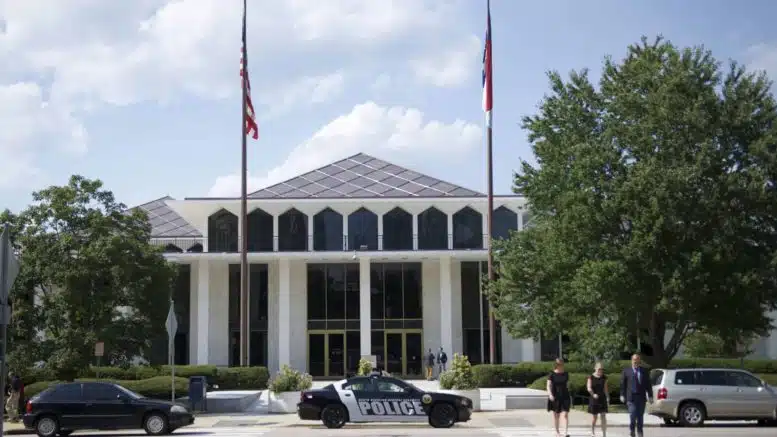By Rose Hoban
On any given day, about 300 North Carolinians in mental health distress sit in the state’s hospital and clinic emergency departments, waiting for a bed in a psychiatric facility where they can get the help they need.
Many of those people wait for days, sometimes weeks.
“We estimate that up to 50 kids spend a night in their local Social Services offices,” Rep. Donny Lambeth (R-Winston-Salem) said during a news conference Tuesday. That’s because there’s often nowhere else for these young people to go, he said.
Lambeth was joined by state House of Representatives members from both parties to roll out a bill that would allocate about $1 billion in one-time money to make much-needed improvements in the state’s mental health system. The House bill is the second government proposal focusing on mental health care availability in North Carolina. Gov. Roy Cooper also proposed spending a billion dollars on mental health priorities in March.
House Bill 855 would use close to two-thirds of the money that will come to North Carolina as part of a federal incentive for states that expand Medicaid. After holding out for a decade, North Carolina lawmakers adopted a bill last month to expand Medicaid, and it was signed by Cooper. If a biennial budget wins approval in the coming weeks, that opens a pipeline for $1.64 billion in federal dollars to be funneled to the state for lawmakers to spend as they see fit.
For Lambeth and his cosponsors, the need to invest that money in mental health is a no-brainer.
“We have a once-in-a-generation opportunity to strengthen our care,” Lambeth said during the Tuesday event. “A focus on this bill will be to open up more care options, providing incentives to staff more beds.”
Likely to be an uphill battle
Buried in President Joe Biden’s hallmark American Rescue Plan were large fiscal incentives for states that had resisted expansion to get on board. In addition to the federal government covering 90 percent of the cost of the Medicaid patients added to the rolls because of expansion, there also are additional matching dollars for beneficiaries already covered by the regular Medicaid program.
All told, that adds up to $817 million in the coming fiscal year and $818 million in the year following.
The money is sorely needed.
In the wake of the coronavirus pandemic, North Carolinians — particularly children — are experiencing record levels of mental health distress. The state is woefully short of resources to address the added needs.
Opioid overdoses have continued to climb despite increased access to treatments and medications to reverse overdoses. Last month, the state Office of the Chief Medical Examiner estimated 355 people died from overdose in North Carolina.
According to data from the national Youth Risk Behavior Surveillance Survey, previewed by the Centers for Disease Control and Prevention in February, children in all age groups are reporting deteriorating mental health and increases in suicidal thoughts.
North Carolina’s youth suicide rate is up, too, climbing from 2.1 deaths per 100,000 to 5.7 deaths per 100,000 over the course of two decades.
Earlier this month, Department of Health and Human Services Sec. Kody Kinsley told NC Health News that there’s been no reduction in the number of children with behavioral health needs heading to the emergency department since 2021. Children are being readmitted to the hospital after they’ve received care, Kinsley added.
Kinsley also said the length of psychiatric hospitalizations has increased for all adolescent age groups. There also has been an increase in children being readmitted to psychiatric residential treatment facilities, he added.
It’s against this backdrop that the lawmakers say they want to spend most of the new federal funding on mental health services.
“We stand today before you, united before you in a bipartisan battle, to combat the plague of mental illness,” said Rep. Kristin Baker (R-Concord), a child psychiatrist. “We stand united before you committing our resources against a common enemy. And it’s an enemy that threatens us, it threatens to steal our joy. It threatens to steal our children, threatens to steal our lives.”

Making a dent
Rep. Carla Cunningham (D-Charlotte) said that the state’s mental health system has been underfunded for years.
“Medicaid reimbursement rates for behavioral health services have not been updated in 10 years and do not reflect the actual costs of providing care leading to fewer providers,” Cunningham said. “There’s an urgent crisis of children with complex behavioral health needs who come into the care of child welfare services.”
But the money the bill proposes to spend could make a dent in that crisis.
Among the proposals in the bill:
“We’ve been talking about mental health reform, probably since I’ve been here, and I think we’re well past the time in which we need to take some action,” Lambeth told reporters. “This will not change quickly. It will take a number of years before we can address some of these problems that we see every day in North Carolina.”









